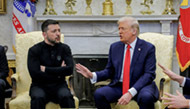“America First” Era Returns: Global Economy and Trade Set for Turbulence
▶ Economic Policies of the Trump Administration
▶ Americans Anticipate Stabilized Prices

In his inaugural address, President Trump stated, “We will no longer be taken advantage of,” emphasizing, “In the Trump administration, I will put America first every single day. The golden age of America begins now.”
He reaffirmed his economic policy priorities, including deregulating energy, imposing tariffs on imports, reviving manufacturing, and strengthening the U.S. economy.
Following his inauguration, the White House immediately unveiled six priority policy agendas on its website. The listed agendas include:
Ending inflation and lowering the cost of living
Tax cuts for American workers
Strengthening border security
Restoring “peace through strength”
Achieving energy dominance
Making America’s cities safe again
Regarding inflation and the cost of living, the White House stated, “Under Trump’s first term, Americans earned more and witnessed record reductions in poverty. President Trump promises to revive the economy by reducing taxes and creating more jobs for workers.”
On tax cuts, the administration pledged to exempt tips and overtime pay from taxation and to make the historic tax reductions from Trump’s first term permanent.
In terms of energy dominance, the White House emphasized providing Americans with low-cost oil, gas, and electricity as a top priority, which will be achieved by promoting domestic energy production.
Addressing tariff policies that are of keen interest to trade partners like South Korea, President Trump reiterated his commitment to overhauling the trade system to protect American workers and families. He announced plans to establish an External Revenue Service (ERS) to collect tariffs, import taxes, and all foreign-source revenues, complementing the existing Internal Revenue Service (IRS).
The Wall Street Journal reported that President Trump plans to investigate trade deficits and unfair trade practices by partner countries. He has consistently advocated for imposing a universal tariff of 10–20% on all imports, with specific proposals to levy a 60% tariff on Chinese goods and 25% tariffs on imports from Mexico and Canada.
Meanwhile, optimism among Americans about Trump’s second term was evident. According to a CBS poll conducted on January 19, 52% of respondents believed the economy in 2025 would improve, compared to 31% who thought it would worsen.
When asked whether Trump’s policies would lower grocery prices, 39% of all respondents agreed, with support rising to 74% among Trump voters. Only 37% of all respondents anticipated rising grocery prices, compared to 6% among Trump supporters.
Regarding whether their economic situation would improve under Trump’s policies, 42% of all respondents and 77% of Trump supporters said it would. While 54% of voters opposed additional tariffs on imports, an overwhelming 82% of Trump supporters favored them.
<Hwandong Cho>
스마터리빙
more [ 건강]
[ 건강]이제 혈관 건강도 챙기자!
[현대해운]우리 눈에 보이지 않기 때문에 혈관 건강을 챙기는 것은 결코 쉽지 않은데요. 여러분은 혈관 건강을 유지하기 위해 어떤 노력을 하시나요?
 [ 건강]
[ 건강]내 몸이 건강해지는 과일궁합
 [ 라이프]
[ 라이프]벌레야 물럿거라! 천연 해충제 만들기
 [ 건강]
[ 건강]혈압 낮추는데 좋은 식품
[현대해운]혈관 건강은 주로 노화가 진행되면서 지켜야 할 문제라고 인식되어 왔습니다. 최근 생활 패턴과 식생활의 변화로 혈관의 노화 진행이 빨라지고
사람·사람들
more많이 본 기사
- [‘로드 레이지’ 한인 피살 현장 상세 상황] 끼어들기 시비가 비극으로… 차에서 내려 “쏴봐라” 언쟁
- 우크라, 20개항 종전안 최신판 공개…영토 할양은 ‘미해결’
- [이민 단속] 여권 소지 시민권자들 … 1
- 가난해서 흙 팠는데… ‘다이아’ 캤다
- [성탄절 문 여는 곳은] 코스코·월마트 닫고… CVS는 영업
- 트럼프, ‘나비넥타이’ 매고 연말 대중문화 시상식 일부 진행
- 크리스마스 대형 폭풍… 침수·산사태 대비 ‘비상’
- 美, 물류거점창고에 불체자 8만명 수용 추진… ‘아마존택배’ 방식
- 트럼프 행정부, H-1B비자 추첨 내년 2월 폐지…고임금 인력 우대
- 취업비자(H-1B), 고연봉자 우선 발급
- “다카이치 내년 3월 후반 미국서 트럼프와 회담 타진”
- MC몽, 차가원 회장 충격 불륜 부인.. “채무 120억 당연히 이행”
- 기부 줄이는 미국인들…트럼프·고물가·탈종교 3중 한파
- 브라운대 총격범, 대학원 중퇴후 고립된 삶… “유령같은 존재”
- 안보리서 ‘베네수엘라’ 긴급회의…美 “합법” vs 중러 “주권침해”
- [이민 단속] 새해에도 더 공격적 단속
- 이대우 뉴저지한인회장, “적자 개인적으로 전액변제”
- 뉴욕시 최저임금 인상⋯ 1월1일부터 17달러
- 군 장교에서 글로벌 교육 리더로‘제2의 인생’ 을 살다
- 연방대법, 시카고 주방위군 투입 ‘기각’
- 해병대전우회 동부연합회·뉴욕해병대전우회 송년회
- 역주행 승용차 덮쳐 한인 등 2명 사망
- [삶과 생각] 제도화된 불법, 합법의 가면을 쓴 민주주의 붕괴
- 두 손 모아 성탄기도… “온 세상에 평화를”
- 맘다니, 샌더스 의원 앞에서 취임선서
- ‘마약 혐의’ 남양유업 창업주 외손녀 황하나 경찰에 체포
- 아시안아메리칸사법경찰자문위원회 송년회
- 46회째 1등 안나온 파워볼 복권 당첨금 17억달러로 껑충 뛰어
- 비전케어 USA 무료 백내장 수술
- 윌리엄 컬렌 브라이언트 고교 한국어반 삼성전자 북미사옥 현장학습
- 엡스타인 자료 추가 공개… “전용기에 트럼프 8번 타”
- [부 고] 박종군 전 뉴욕청과협회장 별세
- 롱아일랜드한국학교 종강식
- 차기 대선 선호도… 공화 ‘밴스’ ·민주 ‘뉴섬’ 선두
- 뉴저지한국학교 종강식^ 학습발표회
- 트럼프 “마두로 물러나라” 최후통첩
- ‘파워볼’ 열풍 계속… 오늘 잭팟상금 17억 달러
- 불체자 자진출국하면 지원금 3배로 ‘3천불’
- 온라인쇼핑과 반품, 그리고 그 이후 1
- [‘로드 레이지’ 한인 피살 현장 상세 상황] 끼어들기 시비가 비극으로… 차에서 내려 “쏴봐라” 언쟁
- 뉴욕한국라이온스클럽· 뉴욕한인합창단 한 해 마무리 합동 송년회 성황
- 해외서도 극과극 반응’대홍수’, 넷플릭스 글로벌 1위 차지”SF 걸작 vs 최악”
- [미국은 지금] MAGA의 분열, 예… 1
- “온 세상에 평화를⋯”
- H-1B비자 고임금·경력자에 우선권
- 트럼프의 새 독트린 “미국을 다시 왜소하게”
- [남가주 6개 은행 전국 예금 현황] 1억달러 이상 예금고 지점 99개
- 정동원, 내년 2월 23일 해병대 입대..전역 예정일은 27년 8월 22일
- 미 해군 군함 명칭 전통 깬 ‘트럼프급 전함’
- 이하늬, 기획사 미등록 혐의 검찰 송치.. “10월 정식 등록”
1/5지식톡

-
 미 육군 사관학교 West Poin…
0
미 육군 사관학교 West Poin…
0https://youtu.be/SxD8cEhNV6Q연락처:wpkapca@gmail.comJohn Choi: 714-716-6414West Point 합격증을 받으셨나요?미 육군사관학교 West Point 학부모 모…
-
 ☝️해외에서도 가능한 한국어 선생님…
0
☝️해외에서도 가능한 한국어 선생님…
0이 영상 하나면 충분합니다!♥️상담신청문의♥️☝️ 문의 폭주로 '선착순 상담'만 진행합니다.☎️ : 02-6213-9094✨카카오톡ID : @GOODEDU77 (@골뱅이 꼭 붙여주셔야합니다…
-
 테슬라 자동차 시트커버 장착
0
테슬라 자동차 시트커버 장착
0테슬라 시트커버, 사놓고 아직 못 씌우셨죠?장착이 생각보다 쉽지 않습니다.20년 경력 전문가에게 맡기세요 — 깔끔하고 딱 맞게 장착해드립니다!장착비용:앞좌석: $40뒷좌석: $60앞·뒷좌석 …
-
 식당용 부탄가스
0
식당용 부탄가스
0식당용 부탄가스 홀세일 합니다 로스앤젤레스 다운타운 픽업 가능 안녕 하세요?강아지 & 고양이 모든 애완동물 / 반려동물 식품 & 모든 애완동물/반려동물 관련 제품들 전문적으로 홀세일/취급하는 회사 입니다 100% …
-
 ACSL 국제 컴퓨터 과학 대회, …
0
ACSL 국제 컴퓨터 과학 대회, …
0웹사이트 : www.eduspot.co.kr 카카오톡 상담하기 : https://pf.kakao.com/_BEQWxb블로그 : https://blog.naver.com/eduspotmain안녕하세요, 에듀스팟입니다…
케이타운 1번가
오피니언
 정숙희 논설위원
정숙희 논설위원온라인쇼핑과 반품, 그리고 그 이후
 파리드 자카리아 / 워싱턴포스트 칼럼니스트 / CNN ‘GPS’ 호스트
파리드 자카리아 / 워싱턴포스트 칼럼니스트 / CNN ‘GPS’ 호스트 트럼프의 새 독트린 “미국을 다시 왜소하게”
 김동찬 시민참여센터 대표
김동찬 시민참여센터 대표 [미국은 지금] MAGA의 분열, 예견된 균열의 시작
 임지영 (주)즐거운 예감 한점 갤러리 대표
임지영 (주)즐거운 예감 한점 갤러리 대표 [수요 에세이] 삶이라는 배를 타고
 이영창 / 한국일보 기자
이영창 / 한국일보 기자[지평선] ‘인간GPT’ 환각의 부작용
 조환동 / 편집기획국장·경제부장
조환동 / 편집기획국장·경제부장 AI로 가속화되는 노동시장 개편
 민경훈 논설위원
민경훈 논설위원‘크리스마스 캐롤’과 산타 클로스
 정재민 KAIST 문술미래전략 대학원 교수
정재민 KAIST 문술미래전략 대학원 교수 [정재민의 미디어풍경] 적과의 동침, 협력하며 경쟁하기
 김영화 수필가
김영화 수필가 [화요칼럼] 단호박의 온기
1/3지사별 뉴스

“온 세상에 평화를⋯”
숨가쁘게 달려온 2025년을 이제 1주일 남짓 남긴 채 크리스마스 이브를 맞는다. 다사다난했던 한 해를 되돌아보며 마무리하는 연말 시즌과 크리…
H-1B비자 고임금·경력자에 우선권

‘올해는 ICE 이민자 체포 광풍의 해’
올 한해동안 버지니아와 메릴랜드, DC 등에서 연방 이민당국에 체포된 사람이 1만명이 훌쩍 넘는 것으로 조사됐다. 또 미 전국적으로는 22만명…
“ATM기 사용하기 겁나네”

연말 ‘로드레이지’ 비극… 한인 총격 피살
연말을 맞아 도로 위에서 순간적으로 벌어진 운전 중 시비가 40대 한인 가장의 총격 피살 비극으로 이어졌다. 워싱턴주 레이시 경찰국과 서스턴 …
[‘로드 레이지’ 한인 피살 현장 상세 상황] 끼어들기 시비가 비극으로… 차에서 내려 “쏴봐라” 언쟁

오늘 하루 이 창 열지 않음 닫기 





















































.png)


댓글 안에 당신의 성숙함도 담아 주세요.
'오늘의 한마디'는 기사에 대하여 자신의 생각을 말하고 남의 생각을 들으며 서로 다양한 의견을 나누는 공간입니다. 그러나 간혹 불건전한 내용을 올리시는 분들이 계셔서 건전한 인터넷문화 정착을 위해 아래와 같은 운영원칙을 적용합니다.
자체 모니터링을 통해 아래에 해당하는 내용이 포함된 댓글이 발견되면 예고없이 삭제 조치를 하겠습니다.
불건전한 댓글을 올리거나, 이름에 비속어 및 상대방의 불쾌감을 주는 단어를 사용, 유명인 또는 특정 일반인을 사칭하는 경우 이용에 대한 차단 제재를 받을 수 있습니다. 차단될 경우, 일주일간 댓글을 달수 없게 됩니다.
명예훼손, 개인정보 유출, 욕설 등 법률에 위반되는 댓글은 관계 법령에 의거 민형사상 처벌을 받을 수 있으니 이용에 주의를 부탁드립니다.
Close
x